综合填空(选词填空)各类动词篇
- 格式:pptx
- 大小:843.75 KB
- 文档页数:38
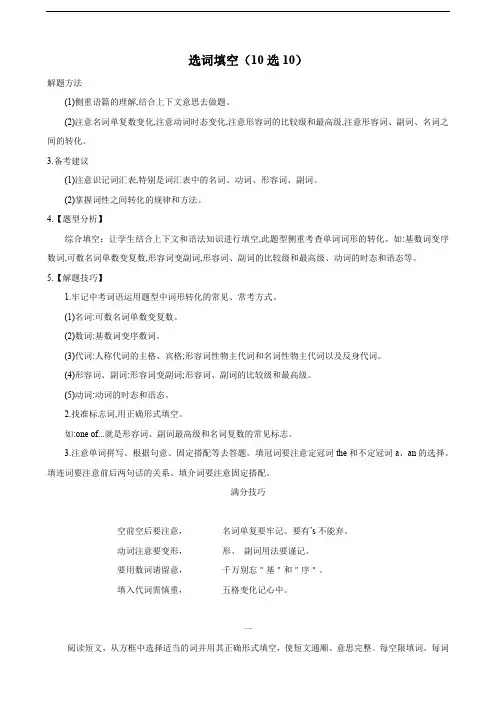
选词填空(10选10)解题方法(1)侧重语篇的理解,结合上下文意思去做题。
(2)注意名词单复数变化,注意动词时态变化,注意形容词的比较级和最高级,注意形容词、副词、名词之间的转化。
3.备考建议(1)注意识记词汇表,特别是词汇表中的名词、动词、形容词、副词。
(2)掌握词性之间转化的规律和方法。
4.【题型分析】综合填空:让学生结合上下文和语法知识进行填空,此题型侧重考查单词词形的转化。
如:基数词变序数词,可数名词单数变复数,形容词变副词,形容词、副词的比较级和最高级、动词的时态和语态等。
5.【解题技巧】1.牢记中考词语运用题型中词形转化的常见、常考方式。
(1)名词:可数名词单数变复数。
(2)数词:基数词变序数词。
(3)代词:人称代词的主格、宾格;形容词性物主代词和名词性物主代词以及反身代词。
(4)形容词、副词:形容词变副词;形容词、副词的比较级和最高级。
(5)动词:动词的时态和语态。
2.找准标志词,用正确形式填空。
如:one of...就是形容词、副词最高级和名词复数的常见标志。
3.注意单词拼写。
根据句意、固定搭配等去答题。
填冠词要注意定冠词the和不定冠词a、an的选择。
填连词要注意前后两句话的关系。
填介词要注意固定搭配。
满分技巧空前空后要注意,名词单复要牢记。
要有’s不能弃。
动词注意要变形,形、副词用法要谨记。
要用数词请留意,千万别忘"基"和"序"。
填入代词需慎重,五格变化记心中。
一阅读短文,从方框中选择适当的词并用其正确形式填空,使短文通顺、意思完整。
每空限填词,每词限用一次。
Peter sees many kinds of animals in the zoo on Sunday. He sees two . 1 They like playing in the water. Peter sees three giraffes ( 长颈鹿) 2 . They’ re 3 and beautiful. They are near a big tree. They like eating leaves (树叶) very much. Peter takes many photo of 4 .Peter also (也) sees a panda. The 5 name is Lanlan. She’ s really cute. She likes sleepingand eating, Bamboo is her 6 food.Peter likes Kingba best. He’ s a strong lion from Africa. He is in the cage (笼子). He likes eating 7 .At last (最后), Peter sees a red 8 black bird (鸟) from America. She can 9 Chinese and English. Peter 10 to talk with (和……谈话) her, but the bird flies away.【答案】1.elephants2. too3.tall4.them5.panda’s6.favorite7. meat8.and9.speak 10.wants二第一节阅读短文,从方框中选择适当的词并用其正确形式填空,使短文通顺、意思完整。
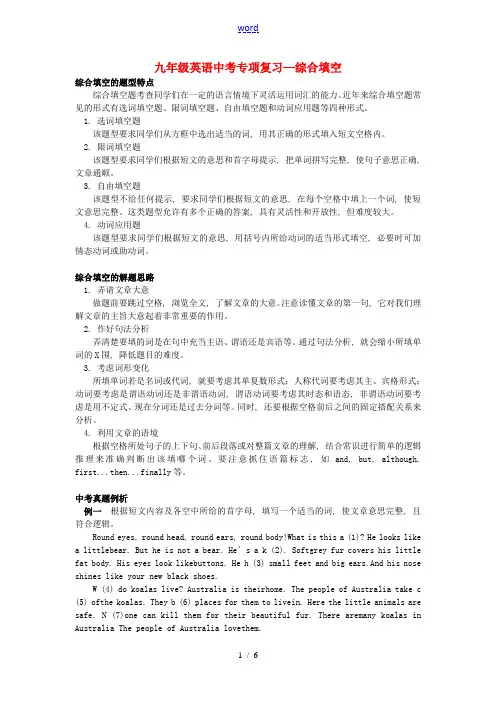
九年级英语中考专项复习—综合填空综合填空的题型特点综合填空题考查同学们在一定的语言情境下灵活运用词汇的能力。
近年来综合填空题常见的形式有选词填空题、限词填空题、自由填空题和动词应用题等四种形式。
1. 选词填空题该题型要求同学们从方框中选出适当的词, 用其正确的形式填入短文空格内。
2. 限词填空题该题型要求同学们根据短文的意思和首字母提示, 把单词拼写完整, 使句子意思正确, 文章通顺。
3. 自由填空题该题型不给任何提示, 要求同学们根据短文的意思, 在每个空格中填上一个词, 使短文意思完整。
这类题型允许有多个正确的答案, 具有灵活性和开放性, 但难度较大。
4. 动词应用题该题型要求同学们根据短文的意思, 用括号内所给动词的适当形式填空, 必要时可加情态动词或助动词。
综合填空的解题思路1. 弄请文章大意做题前要跳过空格, 浏览全文, 了解文章的大意。
注意读懂文章的第一句, 它对我们理解文章的主旨大意起着非常重要的作用。
2. 作好句法分析弄清楚要填的词是在句中充当主语、谓语还是宾语等。
通过句法分析, 就会缩小所填单词的X围, 降低题目的难度。
3. 考虑词形变化所填单词若是名词或代词, 就要考虑其单复数形式;人称代词要考虑其主、宾格形式;动词要考虑是谓语动词还是非谓语动词, 谓语动词要考虑其时态和语态, 非谓语动词要考虑是用不定式、现在分词还是过去分词等。
同时, 还要根据空格前后之间的固定搭配关系来分析。
4. 利用文章的语境根据空格所处句子的上下句、前后段落或对整篇文章的理解, 结合常识进行简单的逻辑推理来准确判断出该填哪个词。
要注意抓住语篇标志, 如and, but, although, first...then...finally等。
中考真题例析例一根据短文内容及各空中所给的首字母, 填写一个适当的词, 使文章意思完整, 且符合逻辑。
Round eyes, round head, round ears, round body!What is this a (1)? He looks like a littlebear. But he is not a bear. He’s a k (2). Softgrey fur covers his little fat body. His eyes look likebuttons. He h (3) small feet and big ears.And his nose shines like your new black shoes.W (4) do koalas live? Australia is theirhome. The people of Australia take c (5) ofthe koalas. They b (6) places for them to livein. Here the little animals are safe. N (7)one can kill them for their beautiful fur. There aremany koalas in Australia The people of Australia lovethem.When a koala is born, he has no fur. And he is nobigger t (8) your little toe. Tile mother koalahas a pocket in the front of her body. The b (9)koala stays in this warm pocket. There he stays for sixmonths.When the little koala leaves the pocket, he haslots of fur. And he is about as b (10) as yourshoe. He climbs to his mother’s back. And the motherteaches him to find food.【解析】这是一篇介绍考拉的短文。
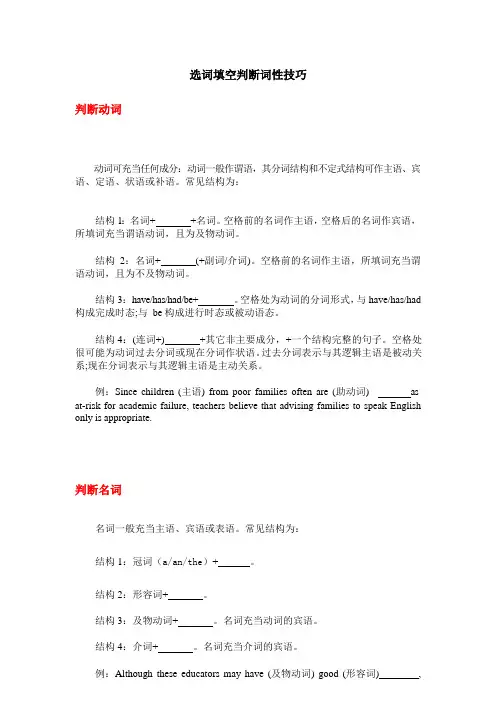
选词填空判断词性技巧判断动词动词可充当任何成分:动词一般作谓语,其分词结构和不定式结构可作主语、宾语、定语、状语或补语。
常见结构为:结构1:名词+ +名词。
空格前的名词作主语,空格后的名词作宾语,所填词充当谓语动词,且为及物动词。
结构2:名词+ (+副词/介词)。
空格前的名词作主语,所填词充当谓语动词,且为不及物动词。
结构3:have/has/had/be+ 。
空格处为动词的分词形式,与have/has/had 构成完成时态;与be 构成进行时态或被动语态。
结构4:(连词+) +其它非主要成分,+一个结构完整的句子。
空格处很可能为动词过去分词或现在分词作状语。
过去分词表示与其逻辑主语是被动关系;现在分词表示与其逻辑主语是主动关系。
例:Since children (主语) from poor families often are (助动词) _ as at-risk for academic failure, teachers believe that advising families to speak English only is appropriate.判断名词名词一般充当主语、宾语或表语。
常见结构为:结构1:冠词(a/an/the)+ 。
结构2:形容词+ 。
结构3:及物动词+ 。
名词充当动词的宾语。
结构4:介词+ 。
名词充当介词的宾语。
例:Although these educators may have (及物动词) good (形容词) ,their advice to families is misguided, and it stems from misunderstandings about the process of language acquisition.判断形容词形容词一般充当定语、表语或补语。
常见结构为:结构1:(不定冠词/定冠词+) +名词。
形容词作定语修饰名词。
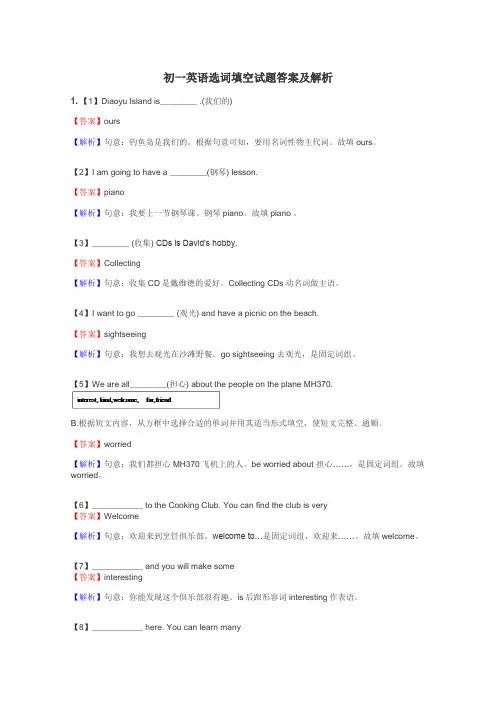
初一英语选词填空试题答案及解析1.【1】Diaoyu Island is________ .(我们的)【答案】ours【解析】句意:钓鱼岛是我们的。
根据句意可知,要用名词性物主代词。
故填ours。
【2】I am going to have a ________(钢琴) lesson.【答案】piano【解析】句意:我要上一节钢琴课。
钢琴piano。
故填piano 。
【3】________ (收集) CDs is David’s hobby.【答案】Collecting【解析】句意:收集CD是戴维德的爱好。
Collecting CDs动名词做主语。
【4】I want to go ________ (观光) and have a picnic on the beach.【答案】sightseeing【解析】句意:我想去观光在沙滩野餐。
go sightseeing 去观光,是固定词组。
【5】We are all________(担心) about the people on the plane MH370.B.根据短文内容,从方框中选择合适的单词并用其适当形式填空,使短文完整、通顺。
【答案】worried【解析】句意:我们都担心MH370飞机上的人。
be worried about 担心……,是固定词组。
故填worried。
【6】___________ to the Cooking Club. You can find the club is very【答案】Welcome【解析】句意:欢迎来到烹饪俱乐部。
welcome to…是固定词组,欢迎来……。
故填welcome。
【7】___________ and you will make some【答案】interesting【解析】句意:你能发现这个俱乐部很有趣。
is后跟形容词interesting作表语。
【8】___________ here. You can learn many【答案】friends【解析】句意:并且你将在这儿交一些朋友。
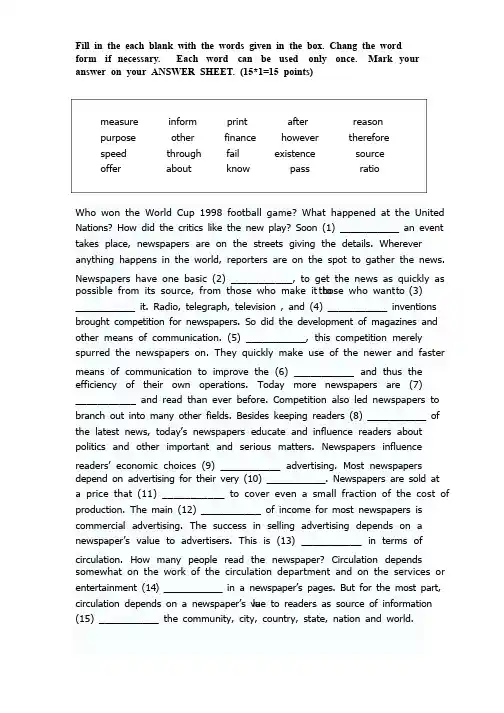
Fill in the each blank with the words given in the box. Chang the word form if necessary. Each word can be used only once. Mark your answer on your ANSWER SHEET. (15*1=15 points) measure inform print after reason purpose other finance however therefore speed through fail existence source offer about know pass ratio Who won the World Cup 1998 football game? What happened at the United Nations? How did the critics like the new play? Soon (1) ___________ an event takes place, newspapers are on the streets giving the details. Wherever anything happens in the world, reporters are on the spot to gather the news. Newspapers have one basic (2) ___________, to get the news as quickly as possible from its source, from those who make it to those who want t o to to (3) (3) ___________ it. Radio, telegraph, television , and (4) ___________ inventions brought competition for newspapers. So did the development of magazines and other other means means means of of of communication. communication. communication. (5) (5) (5) ___________, ___________, ___________, this this this competition competition competition merely merely spurred the newspapers on. They quickly make use of the newer and faster means of of communication communication to to improve improve the (6) (6) ___________ ___________ and and thus thus the efficiency of their own operations. Today more newspapers are (7) ___________ and read than ever before. Competition also led newspapers to branch out into many other fields. Besides keeping readers (8) ___________ of the the latest latest latest news, news, news, today’s today’s today’s newspapers newspapers newspapers educate educate educate and and and influence influence influence readers readers readers about about politics and other important and serious matters. Newspapers influence readers’ readers’ economic economic economic choices choices choices ((9) 9) ___________ ___________ ___________ advertising. advertising. advertising. Most Most Most newspapers newspapers depend on advertising for their very (10) ___________. Newspapers are sold at a price that (11) ___________ to cover even a small fraction of the cost of production. production. The The The main main main (12) (12) (12) ___________ ___________ ___________ of of of income income income for for for most most most newspapers newspapers newspapers is is commercial advertising. The success in selling advertising depends on a newspaper’s value to advertisers. This is (13) ___________ in terms of circulation. How many people read the newspaper? Circulation depends somewhat on the work of the circulation department and on the services or entertainment (14entertainment (14) ___________ in a newspaper’s pages. But for the most part, ) ___________ in a newspaper’s pages. But for the most part, circulation depends on a newspaper’s va lue to readers as source of information (15) ___________ the community, city, country, state, nation and world.参考答案与解析1. after,根据上下文,此空应为介词。
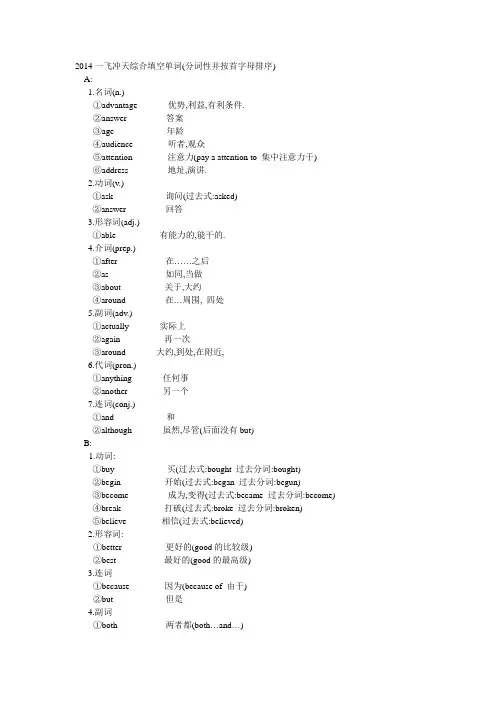
2014一飞冲天综合填空单词(分词性并按首字母排序)A:1.名词(n.)①advantage 优势,利益,有利条件.②answer 答案③age 年龄④audience 听者,观众⑤attention 注意力(pay a attention to 集中注意力于)⑥address 地址,演讲.2.动词(v.)①ask 询问(过去式:asked)②answer 回答3.形容词(adj.)①able 有能力的,能干的.4.介词(prep.)①after 在……之后②as 如同,当做③about 关于,大约④around 在…周围, 四处5.副词(adv.)①actually 实际上②again 再一次③around 大约,到处,在附近,6.代词(pron.)①anything 任何事②another 另一个7.连词(conj.)①and 和②although 虽然,尽管(后面没有but)B:1.动词:①buy 买(过去式:bought 过去分词:bought)②begin 开始(过去式:began 过去分词:begun)③become 成为,变得(过去式:became 过去分词:become)④break 打破(过去式:broke 过去分词:broken)⑤believe 相信(过去式:believed)2.形容词:①better 更好的(good的比较级)②best 最好的(good的最高级)3.连词①because 因为(because of 由于)②but 但是4.副词①both 两者都(both…and…)5.介词①before 在….之前C:1.名词①collection 收集②class 班级,课(可数)2.动词①come 来(过去式:came 过去分词:come)②collect 收集(过去式:collected)③cost 花费(过去式:cost 过去分词:cost)④can 能(过去式:could. Could用于从句中表语气委婉而不是can的过去式)⑤close 关闭(过去式:closed)⑥carry 拿⑦correct 改正⑧change 改变(过去式:changed)⑨call 呼叫(过去式:called)3.形容词①close 亲近的②careful 认真的,仔细的(副词形式:carefully)D:1.名词①day 天(可数)2.形容词①different 不同的②deep 深得③difficult 困难的3.介词①down 向下的E:1.名词①education 教育2.动词①explore 探索②eat 吃(过去式:ate 过去分词:eaten)3.形容词①easy 简单的②exciting 令人兴奋的(修饰物)excited (修饰人)③enough 充足的④empty 空的⑤else 其他的4.副词①early 早②even 甚至5.代词①each 每个②every 每一个③everything 每件事F:1.名词①family 家庭,家人②friend 朋友③floor 地板2.动词①feel 感觉(过去式:felt 过去分词:felt)②find 寻找,发现(过去式:found 过去分词:found)③finish 完成④forget 忘记(过去式:forgot 过去分词:forgotten)3.形容词①familiar 熟悉的②full 充满的③foreign 外国的4.副词①first 首先G:1.名词①group 组2.动词①get 得到,变得(过去式:got 过去分词:got)H:1.名词①height 高度②holiday 假期③home 家2.动词①help 帮助(过去式:helped)②have 有<表示人有>(过去式:had 过去分词:had)③happen 发生3.形容词①hard 努力的②happy 开心的4.副词①hard 困难地5.连词①how 怎么6.代词①him 他(宾格)I:1.名词①idea 办法,方法2.动词①is 是(过去式:was 过去分词:been)②improve 提高(过去式:improved)③instead 代替3.形容词①important 重要的②ill 生病的③interesting 有趣的(修饰物)Interested 有趣的(修饰人)④impossible 不可能的4.代词①it 它(主格)Its 它的(形容词性物主代词)5.介词①in 在….上,在…里②into 进, 在…里K:1.动词①knock 敲②know 知道③keep 保持(后加doing)L:1.名词①life 生活,生命②leave 叶子(可数)③land 地,陆地,地面2.动词①last 持续②like 喜欢(过去式:liked)③leave 离开(过去式:left 过去分词:left)④lie 躺,说谎(过去式:lay过去分词:lain)⑤listen 听⑥love 爱⑦lose 浪费,失败(过去式:lost 过去分词:lost)3.形容词①last 最新的②left 左边的③low 低的④large 大的4.副词①last 上次②later 后来③lucky 幸运地M:1.名词①mountain 山②matter 问题,麻烦③message 信息2.动词①mean 意味②mention 提及③make 做(make do.使某人怎样:make sb形容词.)[过去式:made过去分词:made]④may/might 可能3.形容词①main 主要的②more 更多的③most 大多数的,最多的,④million 百万的5.副词①most 最……②much 非常6.代词①my 我的(主格)[反身代词:myself 宾格:me名词性物主代词:mine ]N:1.代词①nobody 没有人②none 没有人2.形容词①none 没有的(none of)3.副词①never 从来不O:1.名词①office 办公室2.形容词①only 唯一的4.副词①only 只有,仅②out 不流行的,落伍的5.代词①other 其他人②one 一个人6.介词①on 在7.连词①or 或者,否则P:1.名词①paper 纸②problem 问题③patent 父母(加s指父母双方,不加s指父母其中一人)④place 地方2.动词①play 玩,扮演,播放……(过去式played 过去分词 played)②put 拿(过去式 put 过去分词 put)③pick 拾起,捡起(过去式 picked 过去分词 picked)④practise 练习(过去式practised 过去分词practised)[practise+doing]⑤punish 惩罚Q:1.形容词①quick 迅速的②quiet 安静的2.副词①quickly 迅速地②quite 非常R:1.名词①river 河②result 结果2.动词①realize 认识②remember 记得3.形容词①recent 最近的②right 对的,右边的S:1.名词①subject 学科②soldier 军人③store 商店,仓库,储备2.动词①stop 停止(过去式:stopped)②seem 看起来③sit 坐( sit down 坐下)④suggest 建议⑤study 学习⑥spend 花费(过去式spent过去分词:spent )<花费时间: 主语+spend+时间+(in) doing sth 花费钱: spend on >⑦sell 卖(sell out 卖光)[过去式:sold 过去分词:sold]⑧start 开始⑨speak 说(过去式:spoke过去分词:spoken)⑩satisfy 满意,高兴,使满意(过去式satisfied 过去分词satisfied)⑪shop 购物3.形容词①special 特殊的②strange 陌生的4.连词①so 所以5.sorry 抱歉T:1.名词①trip 旅行②time 时间③trouble 麻烦④tool 工具2.动词①teach 教(过去式:taught 过去分词:taught)②throw 扔(过去式:threw过去分词:thrown)③think 认为.想(过去式:thought过去分词:thought)④try 尝试(过去式:tried 过去分词:tried)3.介词①to 到..像..(一般后接动词原形。
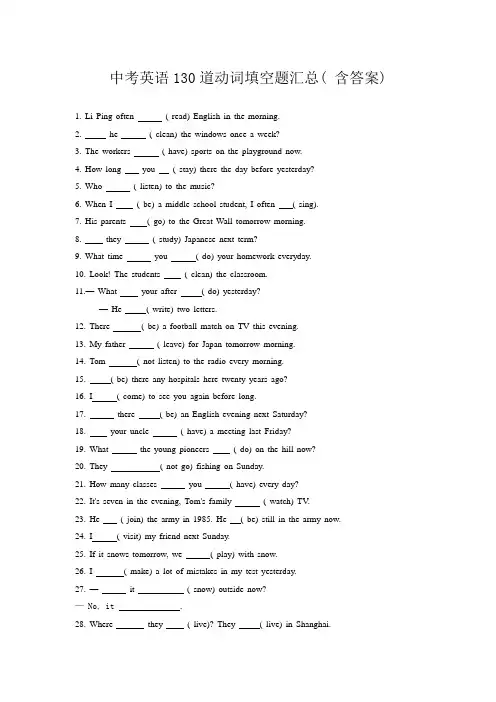
中考英语130道动词填空题汇总( 含答案)1. Li Ping often ( read) English in the morning.2. he ( clean) the windows once a week?3. The workers ( have) sports on the playground now.4. How long you ( stay) there the day before yesterday?5. Who ( listen) to the music?6. When I ( be) a middle school student, I often ( sing).7. His parents ( go) to the Great Wall tomorrow morning.8. they ( study) Japanese next term?9. What time you ( do) your homework everyday.10. Look! The students ( clean) the classroom.11.—What your after ( do) yesterday?—He ( write) two letters.12. There ( be) a football match on TV this evening.13. My father ( leave) for Japan tomorrow morning.14. Tom ( not listen) to the radio every morning.15. ( be) there any hospitals here twenty years ago?16. I ( come) to see you again before long.17. there ( be) an English evening next Saturday?18. your uncle ( have) a meeting last Friday?19. What the young pioneers ( do) on the hill now?20. They ( not go) fishing on Sunday.21. How many classes you ( have) every day?22. It's seven in the evening, Tom's family ( watch) TV.23. He ( join) the army in 1985. He ( be) still in the army now.24. I ( visit) my friend next Sunday.25. If it snows tomorrow, we ( play) with snow.26. I ( make) a lot of mistakes in my test yesterday.27. —it ( snow) outside now?— No, it .28. Where they ( live)? They ( live) in Shanghai.29. If it ( rain) this morning, we won't go shopping.30. Listen! Who ( sing) in the next room?31. The teacher ( not teach) us a Chinese song, he ( teach) us an English song two days ago.32. If I am free this evening, I ( help) you with your maths.33. —you ( be) there tomorrow?— No, I .34. Where ( be) your parents last year? They ( be) in Xi' an.35.—Why they ( go) to the library after school yesterday?—Because they ( want) to borrow some books.36. What you ( do) these days?37. Don't make a noise. Grandma ( sleep).38. Sometimes he ( help) his mother with the housework.39. Please write to us as soon as you ( get) there.40. We ( show) the foreign friends around Beijing when they get here.41. We' ll wait till you ( make) up your mind.42. They just ( talk) about you.43. —Where he ( be)?—He ( be) to the bank.44.—you ( visit) the Science Museum?—Yes, I .45. —she ( tell) you the good news?—No, she .46. How long your mother ( teach) English in this school?---For ten years.47. We already ( draw) five pictures.48. My grandson ( be) ill for a week.49. —the train ( arrive)?—No, not yet.50. Our physics teacher ( not come) to work today, because he is ill.51. My brother ( make) many American friends since he went there two years ag o.52. She ( work) in a factory for three years before she went to college.53. Mr. Brown ( live) in London for ten years by the end of last month.54. How many English words you ( learn) by the end of last term?55. they ( pick) all the apples before the farmer got there?56. I didn't return the book to the library, because I ( not finish) reading it.57. The boy said that he ( not break) the window.58. Jack said that he ( not go) over his lessons yet.59. John told me that he ( fly) to Japan next Wednesday.60. Did she say when she ( be) back tomorrow?61. The head master said he ( meet) some foreigners at the station soon.62. I wondered if our team ( win) this evening.63. He said he ( not make) the same mistakes again.64. We ( have) a meeting at that time.65. Tom ( not have) breakfast yesterday morning.66. Did he know he ( have) an English les t the next day?67. your father ( go) to work by bike every day?68. Mr Wang ( teach) us maths since 1990.69. They will have a trip to the Great Wall if it ( not rain) next Sunday.70. When I got home my grandmother ( make) cakes.71. I ( give) the note to him as soon as school is over.72. The English song ( teach) now over the radio.73. English ( speak) all over the world.74. The Great Green Wall must ( build) in the world.75. Can the report ( write) in English?76. The mountain will ( cover) with the trees in a few years.77. The young trees must ( tie) to the stick to keep it straight.78. So far, many man-made satellites have ( send) up into space.79. English ( speak) in Canada.80. Tennis ( invent) a hundred years ago.81. It ( snow) hard now. We'd better ( not go) home right no w.82. These exercises must ( do) by yourself.83. Our teacher told us time ( be) life.84. We ( not see) each other since he ( leave) here.85. you ever ( ride) a horse before?86. Miss Green ( be) in China for 6 years.87. We never ( be) to Hawaii.88. You'd better try to give up ( smoke). It's too bad to your health.89. Who is doing well in ( describe) things?90. Have you finished ( read) the book?91. Have you saw someone ( ski) before?92.—Can a shark stop ( swim)?—No, It can't.93. You'd better try ( do) it by yourself.94. The students kept ( talk) about the football match.95. I had a computer lessons first. Then I went on ( have) tennis lessons.96. He hopes ( see) the famous football player as soon as possible.97. The boy kept ( ask) strange questions to his teacher, it made the teacher unhappy.98. Edison enjoyed ( try) his new ideas.99. He asked me ( speak) loudly.100. Students must study hard ( make) our country strong.101. The policeman made him ( stand) in the rain for half an hour.102. Would you like something nice ( eat)103. I can't decide which sweater ( choose)104. He hasn't decided whether choose ( tell) the truth.105. He told me where ( buy) a computer.106. Will you please ( not talk) in the reading room.107. I have a lot of work ( do).108. Why not ( come) a little earlier?109. I'm sorry ( hear) that.110. When did you finish ( pack) ?111. ( talk) with her is a great pleasure.112. English is not so easy ( learn) well.113. When makes him ( think) I am a scientist.114. I forgot ( bring) my textbook with me.115. Last night I heard Mike ( cry) in the room.116. My idea is ( have) a meeting at once.117. At night, the robot watched him ( sleep). It knew everything about Mr. Mott.118. In the country, he can hear birds ( sing) and sheep ( bleat)119. My job is ( feed) the animals.120. In about 600 years, we will hardly have enough space ( stand) in on the earth.121. Foresthelp to keep water from ( run) away.122. He printer is used for ( print) documents.123. He is busy ( write) his composition.124.The film is worth ( see).125. They prefer to ( stay) at home rather than ( play) basketball.126. Your opinion is worth ( consider).127. Ed starts ( carry) the bag, but trips over his shoes.128. We are going to have lots of fun ( hike) and ( eat) a ne w kind fruit.129. Are you good at ( read) maps?130. Mary heard her father ( say) he would set off the next wee k.KEYS:1. reads2. Does, clean3. are having4. did, stay5. is listening6. was, sang7. will go8. Will, study9. do, do 10. are cleaning 11. did, do, wrote 12. will be13. is leaving 14. doesn't listen 15. Were16. will come / is coming 17. Will, be 18. Did, have19. are, doing 20. don't go 21. do, have 22. are watching23. joined, is 24. will visit 25. will play 26. made27. Is, snowing 28. do, live, live 29. rains 30. is singing31. hasn't taught 32. will help 33. Will, be 34. were, were35. did, go 36. are, doing 37. is sleeping 38. helps 39. get40. will show 41. make 42. have talked 43. has, been44. Have, visited, have 45. Has, told, hasn't46. have, drawn 48. has been 49. Has, arrived50. hasn't come 51. has made 52. had worked53. had lived 54. had, learned55. Had picked56. hadn't finished 57. hadn't 58. hadn't gone59. would fly 60. would be 61. would meet 62. would win63. wouldn't make 64. were having 65. didn't have66. would have 67. Does, go 68. has taught69. doesn't rain 70. was making 71. will give 72. will give73. is spoken 74. be built 75. be written 76. be covered77. be tied 78. been sent 79. is spoken 80. was invented81. is snowing, not go 82. be done 83. is84. haven't seen, left 85. Have, ridden 86. has been87. have, been 88. smoking 89. describing 90. reading91. ski 92. swimming 93. to do 94. talking 95. to have 96. to see 97. asking 98. trying 99. to speak 100. to make 101. stand 102 to eat 103. to choose 104. to tell105.to buy 106.not talk 107.to do e109. to hear 110. packing 111. Talking 112. to learn113. think 114. to bring 115. cry 116. to have 117. sleep 118. singing 119. to feed 120. to stand 121. running122. printing 123. writing 124. seeing 125. stay, play126. considering 127. to carry 128. hiking, eating129. reading 130. saying。
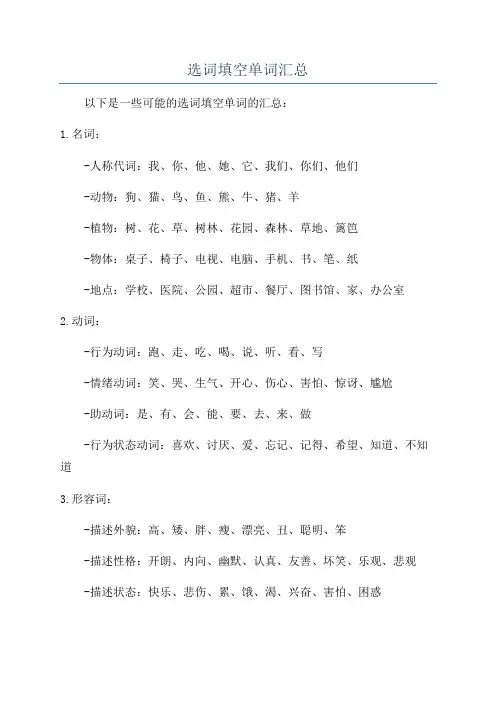
选词填空单词汇总
以下是一些可能的选词填空单词的汇总:
1.名词:
-人称代词:我、你、他、她、它、我们、你们、他们
-动物:狗、猫、鸟、鱼、熊、牛、猪、羊
-植物:树、花、草、树林、花园、森林、草地、篱笆
-物体:桌子、椅子、电视、电脑、手机、书、笔、纸
-地点:学校、医院、公园、超市、餐厅、图书馆、家、办公室
2.动词:
-行为动词:跑、走、吃、喝、说、听、看、写
-情绪动词:笑、哭、生气、开心、伤心、害怕、惊讶、尴尬
-助动词:是、有、会、能、要、去、来、做
-行为状态动词:喜欢、讨厌、爱、忘记、记得、希望、知道、不知道
3.形容词:
-描述外貌:高、矮、胖、瘦、漂亮、丑、聪明、笨
-描述性格:开朗、内向、幽默、认真、友善、坏笑、乐观、悲观-描述状态:快乐、悲伤、累、饿、渴、兴奋、害怕、困惑
以上仅为一些例子,根据上下文和具体语境可能还有其他的选词填空单词选择。
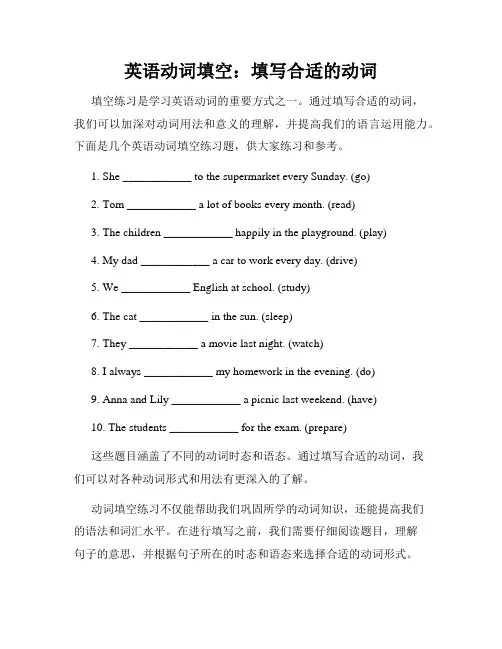
英语动词填空:填写合适的动词填空练习是学习英语动词的重要方式之一。
通过填写合适的动词,我们可以加深对动词用法和意义的理解,并提高我们的语言运用能力。
下面是几个英语动词填空练习题,供大家练习和参考。
1. She ____________ to the supermarket every Sunday. (go)2. Tom ____________ a lot of books every month. (read)3. The children ____________ happily in the playground. (play)4. My dad ____________ a car to work every day. (drive)5. We ____________ English at school. (study)6. The cat ____________ in the sun. (sleep)7. They ____________ a movie last night. (watch)8. I always ____________ my homework in the evening. (do)9. Anna and Lily ____________ a picnic last weekend. (have)10. The students ____________ for the exam. (prepare)这些题目涵盖了不同的动词时态和语态。
通过填写合适的动词,我们可以对各种动词形式和用法有更深入的了解。
动词填空练习不仅能帮助我们巩固所学的动词知识,还能提高我们的语法和词汇水平。
在进行填写之前,我们需要仔细阅读题目,理解句子的意思,并根据句子所在的时态和语态来选择合适的动词形式。
填写动词时,我们要注意动词的主语和动作之间的一致性。
动词的时态和语态也要与句子的要求相匹配。
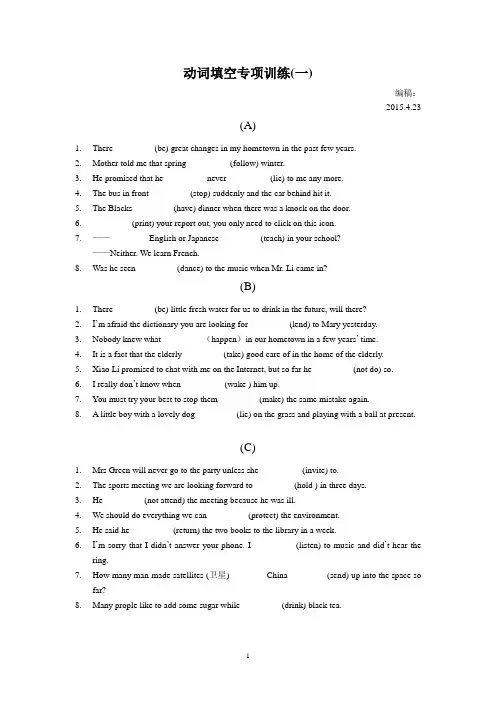
动词填空专项训练(一)编稿:2015.4.23(A)1.There _________(be) great changes in my hometown in the past few years.2.Mother told me that spring _________ (follow) winter.3.He promised that he _________ never _________ (lie) to me any more.4.The bus in front _________(stop) suddenly and the car behind hit it.5.The Blacks _________(have) dinner when there was a knock on the door.6._________(print) your report out, you only need to click on this icon.7.——_________English or Japanese _________(teach) in your school?——Neither. We learn French.8.Was he seen _________(dance) to the music when Mr. Li came in?(B)1.There _________(be) little fresh water for us to drink in the future, will there?2.I’m afraid the dictionary you are looking for _________(lend) to Mary yesterday.3.Nobody knew what _________(happen)in our hometown in a few years’ time.4.It is a fact that the elderly _________(take) good care of in the home of the elderly.5.Xiao Li promised to chat with me on the Internet, but so far he _________(not do) so.6.I really don’t know when _________ (wake ) him up.7.You must try your best to stop them _________(make) the same mistake again.8. A little boy with a lovely dog _________(lie) on the grass and playing with a ball at present.(C)1.Mrs Green will never go to the party unless she _________ (invite) to.2.The sports meeting we are looking forward to _________(hold ) in three days.3.He _________(not attend) the meeting because he was ill.4.We should do everything we can _________(protect) the environment.5.He said he _________ (return) the two books to the library in a week.6.I’m sorry that I didn’t answer your phone. I _________ (listen) to music and did’t hear thering.7.How many man-made satellites (卫星) ________China_________(send) up into the space sofar?8.Many prople like to add some sugar while _________(drink) black tea.(D)1.None of the reporter _________(offer) any special or important information at the newsconference yesterday.2.The officer promised that they _________(search) the missing plane until they found it .3.The women’s World Cup _________(not begin) until 1991 when China hosted it inGuangzhou.4.The police _________(search) this area for the robbers at this time yesterday.5.More and more robots controlled by computers _________(use) to do difficult work in manydangerous places in the future.6.——The newspaper says all the museums will be open for free soon. Do you know that?——Yes, but the government _________(not comform) yet. Let’s just wait and see.7.I hear this kind of magazine _________(come) out once a week.8.Sound _________(travwl) through air at a speed of about 340 metres per second.(E)1.The law of gravity _________(discover) by Isaac Newton about 350 years ago.2.My teeth _________(brush) twice a day. Look, how clean they look.3.Don't worry too much about the boy. His temperature _________ (drop) back to normal if hetakes this medicine.4.When I entered the room, the teacher, together with her lovely students, _________(dance) tothe music.5.I can't find my watch everywhere, I’m sure someone _________(take) it away.6.——Excuse me. May I borrow your dictionary?——Sorry, I _________(use) it now.7.The youngs should be allowed _________(achieve) their dreams on their own.8.The rude visitors that _________(lie) on the ground now will be sent to the police stationsoon.(F)1.The new model of the mobile you look forward to _________(sell) out yesterday.2.He will send you a text message as soon as he _________(reach) Beijing.3.While I busy with my homework, my mother _________(mop) the floor.4.Sorry, I won't go with you. I _________ (visit) the tourist attraction twice.5.My father _________(prefer) jogging to walking, but now he doesn't.6.You can never think of the difficulty we had _________(explain) the problem to them.7._________(study) in the laboratory is not all the life of a great scientist.8.I advised him _________(not drive) in such bad weather.动词填空专项练习(二)编稿:2015.4.23(A)1. This work needs close teamwork. Nothing ________ (achieve) unless we work welltogether.2. While we were discussing our family travel plan that day, Father suggested ________ ( visit)Hawaii—some beautiful islands which lie in Pacific Ocean.3. — I have already decided not to study abroad.— Really? I thought you ________ ( not give) up the chance forever.4. It’s believed that pollution ________ (remain) one of the biggest problems for Chinesegovernment.5. Look! All the birds ________________(fly) away. We can’t see one in the sky now.6. — Judy is too nervous to express herself.— Don’t worry! Look! Miss Zhang is saying a few words ________ (encourage) her.7. The geography teacher said that nearly three quarters of the earth ________ (cover) with water.8. The house in which the Nobel Prize winner ________ (live) as a child is now a museum.(B)1.Flying kites outside is far better than ____________ (spend) time watching TV at home.2. Mrs White has just arrived, but I didn’t know he ______ (come)until yesterday.3. —Could you tell me how your daughter usually goes to school?—Yes. If it is fine, she ____________ (ride) to school.4. The police say that they _______________ (remind) parents not to let their children go out alone on TV the next day.5. It’s said that no decision __________(make) about any future development before all the condidates(候选人) have been interviewed.6. — Did you see a boy in blue come in just now?— Sorry! I __________(chat) with my friends on the phone.7. — I’d like to add a little bit of more sugar to the coffee.— No need. I ________ (put) enough.8. Small steps can be taken ________ (reduce) pollution in our daily lives.(C)1.I wonder which colour the walls__________(paint). I suggest blue.2.--You can’t park your car here. Look at the sign. –Sorry, I _________(not notice) it.3.The paintings the artist has devoted himself to _________(show) in the museum last week.4.I learnt from books that water of these lakes never _________(freeze)in the South.5.--When will you buy a new watch?--Oh, I won’t if I can have the old one__________(repair).6.---Do you understand me?-- Sorry, I __________(think)about something else. I didn’t quite get it.7.What you did _________(improve) people’s lives. They are now enjoying a better life.8.He promised that he ____________(not make) the same mistake again. But it seems hard forhim to keep it.(D)1.The course we are looking forward to __________(include) several different classes.2.This car crashed into a tree by the road on the way back last night.---I suppose they __________(drive) too fast.3.---I saw Jane outside the hospital. Isn’t she in Hong Kong now?---Don’t you know she __________(return) the next day because of illness?e on, Sandy. The floor needs_________(mop). You’d better help me.5. In the United States, lunch _______________ (offer) to students for free at school.6.We weren’t sure what time the workers _____________ (repair) the bridge to let the traffic go.7.I can’t find him because I ____________(forget) where he lives.8.The flowers you are looking forward to _________(sell)out if you don’t order them in time.(E)1.—Why do you often wear the white trousers?--Because they___________(fit)me very well.2.More attention should ___________(pay) to spelling and pronunciation while learning English.3.—What ____________(happen) to the man? He looks so sad.4.The teacher told us that light _________(travel) faster than sound.5.We should do what we can ___________(protect) the environment.6.Sorry, what did you say just now? I _______________(reply) to my friend’s call and didn’t catch your words.7.--Have you taken your medicine today?--No, I _________(take) it after supper.8.The boys didn’t realize what difficulty they ____________(have)until they had to do everything on their own.(F)1.Why don’t you believe me? I ___________(tell) you everything I know.2.The pen I bought yesterday___________(write)so smoothly. Do you want one?lie is over there.I guess she __________(wait) for her friend.4.---I called you at 7:00yesterday evening, but there was no reply.---Sorry, I _________(discuss) a maths problem with my classmate online.5. Must teenage problems such as being crazy about sport or computer games ______________(deal) with as soon as possible?6.The day we had been looking forward to ____________(come) at last.7.Try to wear orange when you are sad. It ________(cheer) you up.8.That’s all for the text. Now let’s go on ___________(do) some exercises in the workbook.动词填空专项练习(二)答案(A)1. will be achieved2. visiting3. wouldn’t give4. remains5. have flown6. to encourage7. is covered8. lived(B)1.spending2.would come3.rides4.reminded5.will be made6.was chatting7.have put8.to reduce(C)1.will be painted2.didn’t notice3.showing4.freezes5.repaired6.was thinking7.has improved8.wouldn’t make(D)1.includes2. were driving3.returned4.mopping5.is offered6.would repair7.have forgotten8.will be sold(E)1.fit2.be paid3. has happened4. travels5.to protect6.was replying7.will take8.would have(F)1.have told2.writes3.is waiting4.was discussing5.be dealt6.came7.will cheer8.to do。
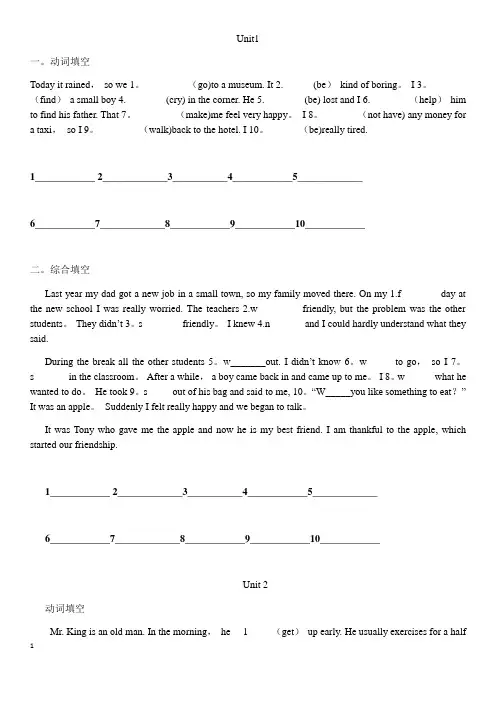
Unit1一。
动词填空Today it rained,so we 1。
_________(go)to a museum. It 2.______(be)kind of boring。
I 3。
_______(find)a small boy 4.________(cry) in the corner. He 5.________(be) lost and I 6.________(help)him to find his father. That 7。
________(make)me feel very happy。
I 8。
_______(not have) any money for a taxi,so I 9。
________(walk)back to the hotel. I 10。
______(be)really tired.1____________ 2_____________3___________4____________5_____________6____________7_____________8____________9____________10____________二。
综合填空Last year my dad got a new job in a small town, so my family moved there. On my 1.f________day at the new school I was really worried. The teachers 2.w_________friendly, but the problem was the other students。
They didn’t 3。
s________friendly。
I knew 4.n_______and I could hardly understand what they said.During the break all the other students 5。
小学动词试题及答案一、选择题1. 他昨天去图书馆看书了。
A. 去B. 看书C. 了D. 了答案:B2. 她正在家里做作业。
A. 正在B. 家里C. 做D. 作业答案:C3. 他们已经完成了作业。
A. 他们B. 已经C. 完成D. 了答案:C4. 你打算什么时候去公园?A. 打算B. 什么时候C. 去D. 公园答案:C5. 妈妈正在做饭。
A. 妈妈B. 正在C. 做饭D. 了答案:C二、填空题1. 我()去超市买东西。
答案:去2. 他们()在操场上踢足球。
答案:正在3. 老师()我们做数学题。
答案:教4. 她()了一本新书。
答案:买了5. 我们()去动物园看动物。
答案:计划三、改错题1. 他去图书馆看书了。
答案:他去图书馆看书。
2. 她正在家里做作业。
答案:她正在家里做作业。
3. 他们已经完成了作业。
答案:他们已经完成了作业。
4. 你打算什么时候去公园?答案:你打算什么时候去公园?5. 妈妈正在做饭。
答案:妈妈正在做饭。
四、连词成句1. 去 / 他 / 公园答案:他去公园。
2. 正在 / 她 / 画画答案:她正在画画。
3. 他们 / 学习 / 英语答案:他们学习英语。
4. 我 / 喜欢 / 听音乐答案:我喜欢听音乐。
5. 爸爸 / 工作 / 忙答案:爸爸工作忙。
【英语】七年级英语下册选词填空综合测试(含答案)一、七年级英语下册选词填空专项目练习(含答案解析)1.选择方框内的短语并用其适当的形式填空(2)The noise went on ________. I couldn't get any sleep.(3)It was a very strange feeling—l was afraid, but excited ________.(4)The little girl ________ the forest to visit her grandmother yesterday.(5)Tina came home late yesterday because she met an old friend ________ home and talked with him for a while.(6)Many builders are working on the ________ to build a house.(7)Jack ________ the door for several times, but nobody answered.(8)I didn't pass the exam again and my mother ________ it.【答案】(1)clean up(2)all night(3)at the same time(4)walked through(5)on her way(6)building site(7)knocked on(8)felt unhappy about【解析】【分析】building site建筑工地;all night整晚;at the same time与此同时;walk through步行穿过;feel unhappy about对......感觉不满意;knock on敲;on one's way在路上;clean up打扫干净(1)句意:在你出去之前你必须打扫干净你的房间,它是如此脏。
初中英语动词填空练习50道1. He often ____ (play) football after school.答案:plays解析:often 是一般现在时的标志词,主语he 是第三人称单数,动词用plays。
2. They ____ (watch) TV last night.答案:watched解析:last night 是一般过去时的标志词,动词用过去式watched。
3. I ____ (read) a book now.答案:am reading解析:now 是现在进行时的标志词,be + 动词的现在分词,I 与am 连用,read 的现在分词是reading。
4. She ____ (like) music very much.答案:likes解析:主语she 是第三人称单数,一般现在时动词用likes。
5. We ____ (have) a party yesterday.答案:had解析:yesterday 是一般过去时的标志词,have 的过去式是had。
6. The boy ____ (run) on the playground at the moment.答案:is running解析:at the moment 是现在进行时的标志词,be + 动词的现在分词,the boy 是第三人称单数,be 动词用is,run 的现在分词是running。
7. My father ____ (go) to work by bike every day.答案:goes解析:every day 是一般现在时的标志词,主语my father 是第三人称单数,动词用goes。
8. They ____ (not do) their homework last weekend.答案:didn't do解析:last weekend 是一般过去时的标志词,否定形式用didn't + 动词原形do。
一年级下册动词填空动词填空:(表示动作、行为)(踩)影子(做)美梦(讲)故事(跳)绳(踢)足球(玩)游戏(听)音乐(打)排球(画)画(丢)手绢(打)雪仗(包)粽子(掀)锅盖(飘)清香(打)篮球(拍)皮球(甩)尾巴(迎)上去(追)上去(晒)太阳(露)肚皮(开)大会(做)好事(打)哆嗦(放)风筝(折)纸船(摇)尾巴(长)绿叶(摘)葡萄(揉)纸团(刮)胡子(砍)大树(吃)害虫(去)学校(立)石碑(讲)故事(画)太阳(尝)水果(搭)积木(捉)虫子(打)招呼(踢)毽子(下)象棋(甩)绳子(丢)沙包(撑)小艇(采)白莲(藏)踪迹(眨)眼睛(搬)东西(打)哈欠(吃)早饭(开)大会(看)手表(伸)舌头(做)鬼脸(掰)玉米(摘)桃子(抱)西瓜(赶)苍蝇(掌握)方向(咬住)尾巴(掉进)湖里(咧开)嘴巴(吐出)棉花(长出)叶子(背着)书包(挎起)篮子(捧起)水花(展开)翅膀(锻炼)身体(掀开)锅盖蜘蛛(结网)蜻蜓(展翅)(剥开)粽叶(走到)桥上(看见)小鸟(煮好)粽子(坐)跷跷板(坐在)背上(邀请)朋友(走出)天山(领导)革命(爱护)小青蛙(保护)禾苗(寻找)食物春风(吹)夏雨(落)鱼(出)水鸟(入)林秋霜(降)冬雪(飘)(跑)步(跳)高(抽)水(插)秧(画)画(喝)水一年级数学下册《十几减9》教案教学目标1、使学生在已有知识经验的基础上,通过观察和操作进一步经历十几减9的计算过程,比较熟练地掌握十几减9的计算方法,并能正确地进行计算。
2、鼓励学生通过独立思考和合作交流,探究出多种计算方法,用自己喜欢的方法来计算十几减9的算式,渗透用多种方法解决问题的能力。
3、引导学生能用“十几减9”的计算方法解决现实问题,使学生初步体会到生活中处处有数学,从而培养学生用数学的意识。
4、培养学生的合作意识和交往能力。
学情分析:通过上个学期20以内的进位加法,对本课的学习已经有了认识的基础。
同时也培养成初步的合作意识、动手操作能力。
另外观察问题发现问题的能力的形成也有利于学生找出自己的学习方法,找到最有效的学习方式。
一.写出下列单词的第三人称单数形式并总结规律play_______say_______buy_______fly_______like_______take_______love_______teach_____fish_______go_______ do_______ have_______二.用所给的动词填入正确形式1.Thank you for ______ (help)me with my English.2.It’s time ______ (have) breakfast.3.It’s time for ______ (have) breakfast.4.It’s time for the students ______ (read) English.5.The children like ______ (play) with dogs.6.He ______ (not know)the teacher’s name .7.Can I ______ (ask) the policeman ?8.Sometimes he ______(go) to school on foot.9.She often _______(watch) TV on Sundays.10.The boy _________(not do ) his homework every day.11.______you ________(like) English?12.What _________his father usually in the evening_______(do) ?13.Mr. Liu ______(have) no children.14.We ________(not have)classes on Sundays.15._______his mother ______(cook)? Yes, she does.16.My brother ___________ (like)playing football very much17.Where do your grandparents come from? They _______(come) from Guangdong.18.Let me _______(help) you.19.Le t’s _______(go) and _______(have) a drink, shall we?20.I want _________(be) a teacher when I am an adult.21. want Han Mei _______(play) with us.22.She would like _________(help) us tomorrow.23.The teacher asks the students _______(call) him back.24.What about _______(have) a picnic?25.I’m sorry .She _______(not be) here now.26. My name ________ Li Ming and I______ a worker. (be)27. Amy often __________ (read) books in the evening.28. Sarah__________ (have) an English class every day.29. What _______ Tom usually _______ (do) on Sundays ?30. Where ______(be) Liu Yun now? She is at home.三。